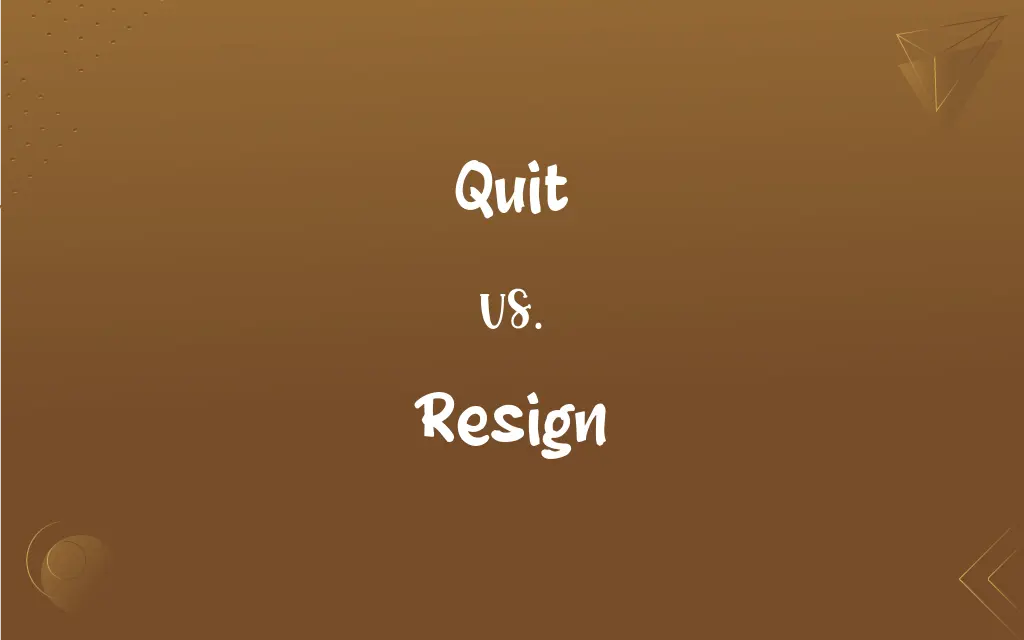Quit vs. Resign: What's the Difference?
Edited by Aimie Carlson || By Janet White || Published on January 18, 2024
Quit refers to voluntarily leave a job or role. Resign refers to formally give up a position or office, often with notice.

Key Differences
Quit typically implies a more spontaneous or informal decision to leave a job, without the need for formalities. Resign, on the other hand, suggests a formal process, often involving a written notice, reflecting a more deliberate decision.
When someone quits, it can be driven by immediate circumstances or dissatisfaction, and the action might be communicated verbally. In contrast, to resign usually requires planning and is a formal declaration of one's intention to leave a position.
Quitting a job may not always involve future career considerations and can be based on personal reasons. Conversely, resigning often takes into account professional reputation and future career prospects, maintaining a more formal tone in departure.
The term quit may carry a more negative connotation, sometimes implying giving up or leaving abruptly. Resign, however, often carries a connotation of professionalism and is associated with leaving a position in good standing.
In some contexts, to quit can mean leaving any situation or activity, not just employment. Resign is specific to relinquishing a formal role or position, especially in a job or official capacity.
ADVERTISEMENT
Comparison Chart
Formality
Informal, can be verbal
Formal, often written
Planning
Can be spontaneous
Usually planned
Connotation
Sometimes negative
More professional
Application
Broad, beyond jobs
Specific to roles/positions
Implication
Personal reasons
Professional considerations
ADVERTISEMENT
Quit and Resign Definitions
Quit
Cease participation.
She decided to quit the competition due to injury.
Resign
Leave a job formally.
After long consideration, he resigned from his teaching position.
Quit
Leave employment.
He quit his job to travel the world.
Resign
Relinquish a role.
Due to health issues, she resigned from her volunteer work.
Quit
Give up an activity.
He quit playing guitar after ten years.
Resign
Step down from a position.
She resigned from her director role for personal reasons.
Quit
Stop an action.
She quit smoking last year.
Resign
Abandon a position with notice.
She resigned from the board with a month's notice.
Quit
Abandon a place.
They quit the city for a quieter life in the countryside.
Resign
Withdraw from a responsibility.
He resigned as the coach of the team.
Quit
To cease or discontinue
Asked them to quit talking.
Quit smoking.
Resign
To submit (oneself) passively; accept as inevitable
I resigned myself to a long wait in line.
Quit
To resign from or relinquish
Quit a job.
Resign
To give up (a position, for example), especially by formal notification.
FAQs
Can "resign" imply leaving in good standing?
Yes, resigning is often seen as leaving a position professionally.
Can "quit" be used for non-job situations?
Yes, "quit" can apply to any activity or situation.
Does "quit" require a notice period?
Quitting often doesn't require a formal notice period.
Is "resign" a formal process?
Yes, resigning is typically a formal process involving written notice.
Is a resignation letter always required?
Typically, yes, especially in professional settings.
Is "resign" used for temporary positions?
It can be, but it's more common in permanent roles.
Is "quit" specific to employment?
No, "quit" can be used in various contexts, not just employment.
Do you need a reason to resign?
While not mandatory, reasons are often given when resigning.
Can "quit" be seen as negative?
Sometimes, it might imply giving up or leaving abruptly.
Can "quit" be informal?
Yes, quitting is often informal and can be verbal.
Is "quit" used in legal contexts?
Not typically, it's more common in everyday language.
Does "resign" imply future planning?
Often, as it usually involves career considerations.
Is "resign" specific to voluntary departure?
Yes, it implies a voluntary decision to leave a position.
Does "resign" require employer acceptance?
Usually, though it's more a formality than a requirement.
Can quitting be immediate?
Yes, quitting can be an immediate action.
Does "resign" always involve a job?
Yes, it's specific to formal roles or positions.
Can "resign" be retracted?
Rarely, and usually depends on the employer's policies.
Can "quit" be used in sports?
Yes, it can refer to ceasing participation in a sport.
Does quitting affect professional reputation?
It can, depending on the manner and context of quitting.
Can "quit" be a positive action?
Yes, especially if it leads to better opportunities or health.
About Author
Written by
Janet WhiteJanet White has been an esteemed writer and blogger for Difference Wiki. Holding a Master's degree in Science and Medical Journalism from the prestigious Boston University, she has consistently demonstrated her expertise and passion for her field. When she's not immersed in her work, Janet relishes her time exercising, delving into a good book, and cherishing moments with friends and family.
Edited by
Aimie CarlsonAimie Carlson, holding a master's degree in English literature, is a fervent English language enthusiast. She lends her writing talents to Difference Wiki, a prominent website that specializes in comparisons, offering readers insightful analyses that both captivate and inform.






































































